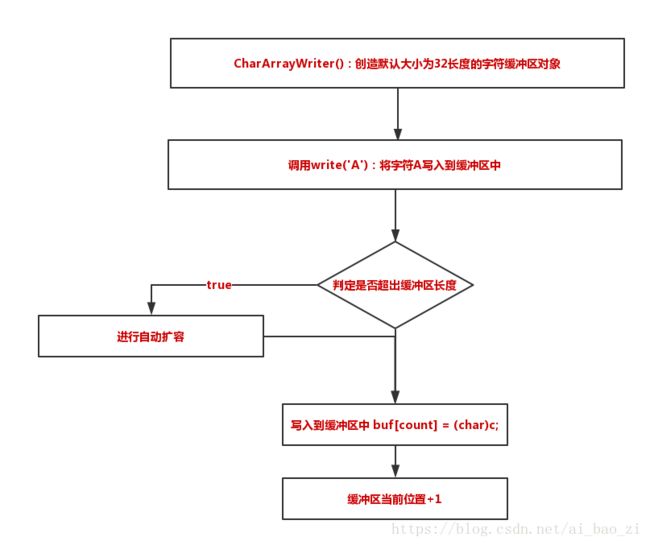JAVA基础知识之CharArrayWriter流
一、CharArrayWriter流定义
API说明:该类实现了一个可用作字符输出流的字符缓冲区,当数据写入流时,缓冲区自动增长,请注意在此类上调用close()无效,并且可以在流关闭后调用此类的方法而不生成IOException。
二、CharArrayWriter流构造函数
根据指定缓冲区大小或者默认缓冲区大小创建CharArrayWriter流对象
/**
*创造默认缓冲区大小的CharArrayWriter对象
*/
public CharArrayWriter() {
this(32);
}
/**
* 创造指定缓冲区大小的CharArrayWriter对象
*/
public CharArrayWriter(int initialSize) {
if (initialSize < 0) {
throw new IllegalArgumentException("Negative initial size: "
+ initialSize);
}
buf = new char[initialSize];
}三、CharArrayWriter流实例域
/**
* 字符缓冲区
*/
protected char buf[];
/**
* 缓冲区中的当前位置
*/
protected int count;四、CharArrayWriter流方法
1)write(int c):写一个字符到缓冲区中
/**
* 写一个单个字符到缓冲区中
*/
public void write(int c) {
synchronized (lock) {
int newcount = count + 1;
//判定写入的下个元素是否超出缓冲区长度
if (newcount > buf.length) {
//进行扩容
buf = Arrays.copyOf(buf, Math.max(buf.length << 1, newcount));
}
buf[count] = (char)c;
count = newcount;
}
}实际流程:
2)write(char c[], int off, int len):从字符数组中写len个字符到缓冲区中
/**
* 将字符数组的一部分写入到缓冲区中,自动扩容增长
*/
public void write(char c[], int off, int len) {
if ((off < 0) || (off > c.length) || (len < 0) ||
((off + len) > c.length) || ((off + len) < 0)) {
throw new IndexOutOfBoundsException();
} else if (len == 0) {
return;
}
synchronized (lock) {
int newcount = count + len;
//判定缓冲区写入len个字符后长度是否超出限制
if (newcount > buf.length) {
buf = Arrays.copyOf(buf, Math.max(buf.length << 1, newcount));
}
System.arraycopy(c, off, buf, count, len);
count = newcount;
}
}实际流程:
3)write(String str, int off, int len):将字符串的一部分写入到缓冲区中
public void write(String str, int off, int len) {
synchronized (lock) {
int newcount = count + len;
if (newcount > buf.length) {
buf = Arrays.copyOf(buf, Math.max(buf.length << 1, newcount));
}
str.getChars(off, off + len, buf, count);
count = newcount;
}
}4)writeTo(Writer out):将缓冲区的内容写入到另一个字符输出流中
public void writeTo(Writer out) throws IOException {
synchronized (lock) {
out.write(buf, 0, count); //本质理解为将缓冲区的内容给写了出去
}
}5)检索缓冲区中的数据
/**
* 将缓冲区中的数据转成字符串
* @return the string.
*/
public String toString() {
synchronized (lock) {
return new String(buf, 0, count);
}
}
/**
* 将缓冲区的数据转成字符数组
*/
public char toCharArray()[] {
synchronized (lock) {
return Arrays.copyOf(buf, count);
}
}6)close():关闭流无效,本质没有做任何操作
/**
* 刷新流--无效
*/
public void flush() { }
/**
* 关闭流--无效
*/
public void close() { }四、CharArrayWriter流的作用
与CharArrayReader流一样,待后期理解加深、实际项目运用过后再来补充

